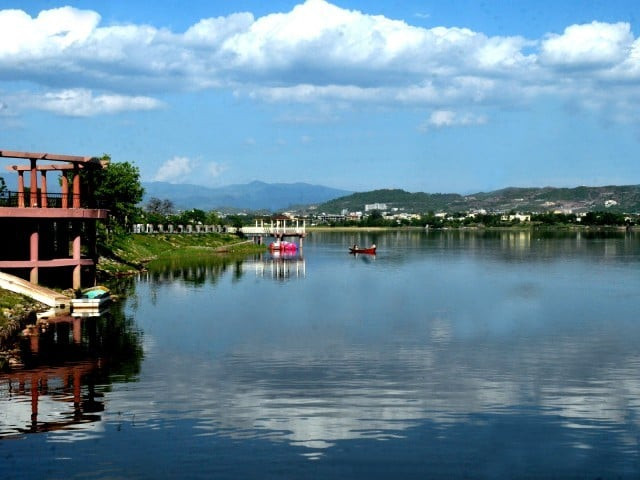Contaminated water supply: Senate panel concerned over waste dumped into Rawal Lake
EPA chief says environment body faces cash crunch to serve as effective monitor

Solid waste, bacteria, microbiological contaminations found. PHOTO: FILE
To make matters worse, mushrooming construction in the city was putting a strain on the city’s limited water resources in the absence of adequate filter plants.
This was expressed during a meeting of the Senate Standing Committee on Climate Change at the Parliament Lodges on Monday with Senator Sitara Ayaz in the chair.
The meeting started with a screening of a short documentary on the level of contamination in the water bodies of Islamabad including the Rawal Lake — which is the main water supply source for residents of Islamabad and Rawalpindi.
Senator Ayaz noted that the Rawal Dam, which serves as a water supply reservoir, was being contaminated by toxic water which drains into the lake.
Committee members noted that waste from the Rawal Lake Park was also dumped into the lake which further contaminates the water in the reservoir.
Lawmakers said that there must be a mechanism to keep water in the reservoir clean of any such solid waste.
Senator Ayaz expressed despair at the state of the capital and said that the mushroom growth of illegal high-rises, petrol pumps and compressed natural gas (CNG) filling stations were aggravating the problem for which it is imperative that the civic authority of the capital, the Capital Development Authority (CDA) is taken to task.
The committee decided to invite officials of CDA and the Islamabad Metropolitan Corporation (IMC) at its next meeting to discuss the issue.
EPA hamstrung
Pakistan Environmental Protection Agency (Pak-EPA) Director General Farzana Altaf Shah briefed the committee on the functions of the environment watchdog. She detailed how it had been working as an attached department of the Climate Change Ministry following the promulgation of the Pakistan Environmental Protection Ordinance 1983.
The EPA, she said, was involved in formulating environmental rules and regulations. It also had fixed and mobile automatic air quality monitoring stations and at the moment all the analyzers of fixed and mobile air quality monitoring stations have been repaired and calibrated and are fully functional which allow it to monitor all the major parameters of air quality by mobilising its mobile air quality stations anywhere.
However, Shah said that the body was facing an acute shortage of human resources and funds to overcome environmental issues in the federal capital.
In this regard, she said that they had no budgeting provision for the maintenance of laboratories, monitoring field activities, review of environmental impact assessments (EIA) and biosafety monitoring
Briefing the panel on the agency’s performance, she said that they have issued 12 Environmental Protection Orders (EPO) to different polluters including the CDA, developers and industrial units under section 16 (12) of Pakistan Environmental Protection Act 1997.
Moreover, 54 notices were issued to offenders and polluters, violators of the act.
Directions were also issued to the Pakistan Institute of Medical Sciences (PIMS) for installation of an incinerator and to comply with the Hospital Waste Management Rules 2005, which the agency had helped formulate.
Shah, however, noted that they lacked sufficient human resource for monitoring of hospitals and the method of waste disposal.
Regardless, she said that since 2000, they had received 74 EIAs of which 46 had been approved along with an EMP.
Moreover, 136 applications have so far been received for IEE of which 82 were approved along with two EMPs.
For petrol pumps and CNG stations, Shah said that these cases were forwarded by the Oil and Gas Regulatory Authority (OGRA). Since 2004, they have received 92 cases for petrol pumps of which 81 were approved. For CNG stations, all 133 applications received were approved.
Senator Ayaz asked why EPA had been created if it did not have the facilities and human resources to do its job.
The committee also decided to call separate meetings on the matters related to Pak-EPA and international conventions, treaties and agreements.
Senator Sherry Rehman recommended that the EPA must furnish a list of non-compliances so that ministry can be made accountable.
Climate Change Ministry Secretary Khizer Hayat said that they were making efforts to achieve the set targets as per international conventions and treaties.
However, he said that there is a need to develop working coordination with the provinces for achieving the set targets.
Published in The Express Tribune, September 18th, 2018.



















COMMENTS
Comments are moderated and generally will be posted if they are on-topic and not abusive.
For more information, please see our Comments FAQ